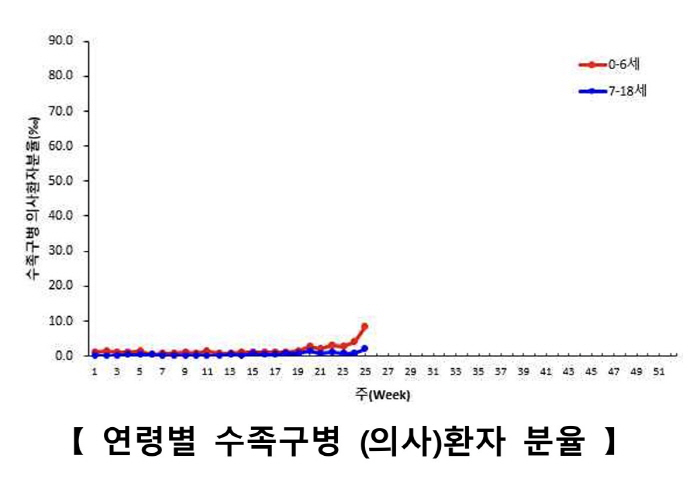Infant, Hand, and Paw Disease Emergency...What if an adult gets caught?
Jun 29, 2025
|
According to the Korea Centers for Disease Control and Prevention, the incidence of hand-foot-and-mouth disease (doctor's patient ratio) was on the rise last week with 5.8/1000 (6.15.~6.21.), and in particular, the number of 0-6 years old was 8.3/1000, which was higher than that of 7-18 years old (1.9). Considering the characteristics that increase in earnest from May every year and occur a lot between June and September, the incidence of patients is expected to increase for the time being.
Hand-foot-and-mouth disease is an acute viral disease caused by enterovirus (enterovirus), and is transmitted when it comes into direct contact with a patient's feces or secretions (saliva, phlegm, runny nose, blisters, etc.), or when it touches objects contaminated with these things. The main symptoms are blisterous rashes in the hands, feet, and mouth, and fever, helplessness, loss of appetite, and gastrointestinal symptoms (diarrhea, vomiting).
In order to prevent hand-foot-and-mouth disease, thorough hygiene management is most important, such as after going out, before and after meals, after diaper treatment, making sure to wash hands after taking care of patients, and washing clothes with excrement cleanly.
At home, symptoms improve after 3 to 4 days and most heal after 7 to 10 days, but complications such as meningitis and encephalitis can rarely occur, so if you show suspicious symptoms of hand-foot-and-mouth disease, you should quickly visit a medical institution for treatment. In addition, the use of multi-use facilities should be refrained, and items related to patients should be washed and disinfected.
Hand-foot-and-mouth disease is common in children, but due to its highly contagious nature, adults with reduced immunity can also be infected. People with hand-foot-and-mouth disease are most contagious in the first week of the outbreak, but they can continue to transmit it for weeks after the symptoms disappear.
In general, it is known that symptoms appear mildly when an adult is caught, but it is known that there are not a few cases of severe illness that even the nails and nails fall out. Healthy adults usually recover without complications, but the elderly or immunocompromised individuals cannot rule out severe complications such as meningitis and myocarditis, so they should be careful. Like infants and toddlers, it is recommended to follow hygiene rules and refrain from going to work or going out until the symptoms completely disappear.
This article was translated by Naver AI translator.














